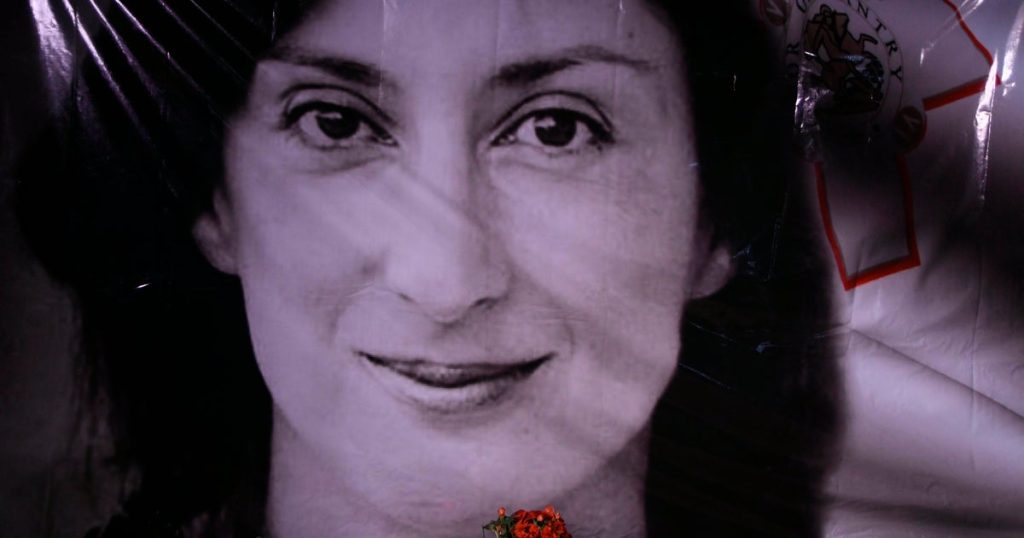Two men have been convicted in Malta for their roles in the tragic murder of investigative journalist Daphne Caruana Galizia in 2017. Robert Agius, 41, and Jamie Vella, 42, were found guilty of supplying the explosives used in the car bombing that killed Caruana Galizia, a prominent reporter known for her fearless investigations into corruption. Their sentencing is expected early next week, and prosecutors are seeking life imprisonment for both. This verdict comes amidst a broader context of ongoing scrutiny and public outrage regarding the circumstances surrounding her assassination.
| Article Subheadings |
|---|
| 1) Overview of Convictions and Reactions |
| 2) Role of Key Witnesses in the Trial |
| 3) Background on Daphne Caruana Galizia’s Work |
| 4) Public Outcry and Political Fallout |
| 5) Ongoing Investigations and Future Implications |
Overview of Convictions and Reactions
In a landmark ruling, the Maltese courts have convicted Robert Agius and Jamie Vella of complicity in the assassination of Daphne Caruana Galizia. The verdict was delivered late Thursday night after a scrutinizing six-week trial, during which more than 150 testimonies were heard, including those of family members, FBI representatives, and former members of the Maltese government. Both men are expected to receive life sentences, as prosecutors push for the maximum penalty due to the heinous nature of the crime. The Caruana Galizia family expressed their relief, stating that the convictions are a “step closer to justice,” yet they lamented the lack of reform regarding systemic failures that allowed her murder to transpire.
Role of Key Witnesses in the Trial
The trial’s outcome heavily relied on the testimony of Vince Muscat, one of the individuals who participated directly in the assassination plot. Having pleaded guilty to the murder, Muscat’s agreement to testify against Agius and Vella was pivotal. His cooperation was facilitated through a plea deal that promised a reduced sentence in exchange for his valuable insights into the conspiracy behind Caruana Galizia’s death. His testimony exposed the intricate web of collusion and deceit that enveloped the assassination, illustrating not only how the murder was orchestrated but also the motivations of those involved. With Muscat’s cooperation, authorities were able to connect the dots leading back to Agius and Vella, marking a significant breakthrough in the case.
Background on Daphne Caruana Galizia’s Work
Daphne Caruana Galizia was renowned as a formidable investigative journalist whose work focused on exposing corruption within Malta’s political and business elite. Over her 30-year career, she published numerous articles and blog entries through her platform, “Running Commentary,” that scrutinized various high-profile figures and their questionable dealings. Galizia’s relentless pursuit of truth earned her the nickname “one-woman Wikileaks.” Her investigations on money laundering, bribery, and corruption often put her at odds with powerful individuals, leaving her to fear for her safety. Her son, Paul Galizia, revealed that she was acutely aware of the threats against her life and that she believed those in power were attempting to silence her.
Public Outcry and Political Fallout
The public response to Caruana Galizia’s murder was swift and profound. It ignited widespread protests across Malta, directed primarily at then-Prime Minister Joseph Muscat, whom many accused of attempting to shield his associates from accountability. The public outcry eventually contributed to Muscat’s resignation in December 2019, highlighting the government’s perceived complicity or negligence in protecting its journalists. The case drew international attention as it underscored the dangers faced by journalists in corrupt environments, with numerous advocacy groups demanding justice and rendering calls for a more robust protection for media personnel worldwide. The assassination served as a rallying point for reform, advocating for a commitment to free speech and the protection of journalists globally.
Ongoing Investigations and Future Implications
While the convictions of Agius and Vella mark a critical step in the pursuit of justice, the case remains far from resolved. Yorgen Fenech, a businessman with close ties to the previous administration, is still awaiting trial on charges that he orchestrated the assassination. Arrested in November 2019 while attempting to flee Malta, Fenech’s trial date has yet to be set, prolonging a complex legal battle. The situation around his trial could reveal further shocking aspects of the case, especially regarding systemic issues within Malta’s political landscape. The lingering questions about accountability and transparency continue to resonate, underscoring the urgent need for reforms aimed at protecting journalists and combating corruption.
| No. | Key Points |
|---|---|
| 1 | Convictions of Robert Agius and Jamie Vella for involvement in Daphne Caruana Galizia’s 2017 assassination. |
| 2 | Vince Muscat’s plea deal was crucial in revealing the conspiracy behind the murder. |
| 3 | Daphne Caruana Galizia’s work focused on exposing corruption and held significant influence in Malta. |
| 4 | Public protests erupted following her murder, leading to political consequences for Joseph Muscat. |
| 5 | Ongoing investigations highlight the unresolved issues surrounding accountability and reform within Malta. |
Summary
The convictions of Agius and Vella represent a pivotal moment in the ongoing saga surrounding Daphne Caruana Galizia’s assassination, drawing attention to the broader issue of journalistic freedom in Malta. While some justice has been served, the case exposes systemic flaws and calls into question the safeguarding mechanisms for journalists. The implications of this trial extend far beyond Malta, emphasizing the universal need for protections for those who dare to speak truth to power.
Frequently Asked Questions
Question: What was the main focus of Daphne Caruana Galizia’s investigations?
Daphne Caruana Galizia primarily investigated corruption, money laundering, and political misconduct within Malta’s elite, using her platform to expose fraudulent activities.
Question: Why was her murder significant in Malta?
Her murder was significant as it highlighted the threats faced by journalists in Malta, igniting public outrage and protests against the government’s alleged complicity in shielding perpetrators.
Question: What are the repercussions following her assassination?
Following her assassination, there have been increased calls for legal reforms to protect journalists, with broader implications for media freedom and accountability in Malta and beyond.


